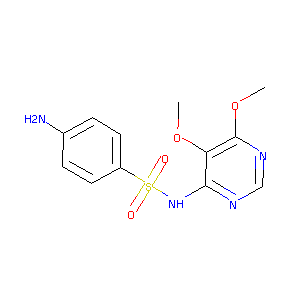| 1 |
Drugs@FDA. U.S. Food and Drug Administration. U.S. Department of Health & Human Services. 2015
|
| 2 |
URL: http://www.guidetopharmacology.org Nucleic Acids Res. 2015 Oct 12. pii: gkv1037. The IUPHAR/BPS Guide to PHARMACOLOGY in 2016: towards curated quantitative interactions between 1300 protein targets and 6000 ligands. (Ligand id: 4800).
|
| 3 |
The fight against drug-resistant malaria: novel plasmodial targets and antimalarial drugs. Curr Med Chem. 2008;15(2):161-71.
|
| 4 |
Drugs@FDA. U.S. Food and Drug Administration. U.S. Department of Health & Human Services.
|
| 5 |
Mutant Gly482 and Thr482 ABCG2 mediate high-level resistance to lipophilic antifolates. Cancer Chemother Pharmacol. 2006 Dec;58(6):826-34.
|
| 6 |
Expression of Organic Anion Transporter 1 or 3 in Human Kidney Proximal Tubule Cells Reduces Cisplatin Sensitivity. Drug Metab Dispos. 2018 May;46(5):592-599.
|
| 7 |
Interactions between Oroxylin A with the solute carrier transporters and ATP-binding cassette transporters: Drug transporters profile for this flavonoid. Chem Biol Interact. 2020 Jun 1;324:109097. doi: 10.1016/j.cbi.2020.109097. Epub 2020 Apr 16.
|
| 8 |
Application of higher throughput screening (HTS) inhibition assays to evaluate the interaction of antiparasitic drugs with cytochrome P450s. Drug Metab Dispos. 2001 Jan;29(1):30-5.
|
| 9 |
Inhibition of glutathione S-transferases by antimalarial drugs possible implications for circumventing anticancer drug resistance. Int J Cancer. 2002 Feb 10;97(5):700-5.
|
| 10 |
The antimicrobial drug pyrimethamine inhibits STAT3 transcriptional activity by targeting the enzyme dihydrofolate reductase. J Biol Chem. 2022 Feb;298(2):101531. doi: 10.1016/j.jbc.2021.101531. Epub 2021 Dec 23.
|
| 11 |
Selection of drugs to test the specificity of the Tg.AC assay by screening for induction of the gadd153 promoter in vitro. Toxicol Sci. 2003 Aug;74(2):260-70. doi: 10.1093/toxsci/kfg113. Epub 2003 May 2.
|
| 12 |
Crystal structure of -hexosaminidase B in complex with pyrimethamine, a potential pharmacological chaperone. J Med Chem. 2011 Mar 10;54(5):1421-9. doi: 10.1021/jm101443u. Epub 2011 Jan 25.
|
| 13 |
Pyrimethamine induces apoptosis of melanoma cells via a caspase and cathepsin double-edged mechanism. Cancer Res. 2008 Jul 1;68(13):5291-300. doi: 10.1158/0008-5472.CAN-08-0222.
|
| 14 |
Antifolate activity of pyrimethamine enhances temozolomide-induced cytotoxicity in melanoma cells. Mol Cancer Res. 2009 May;7(5):703-12. doi: 10.1158/1541-7786.MCR-08-0263. Epub 2009 May 12.
|
| 15 |
Systems pharmacological analysis of drugs inducing stevens-johnson syndrome and toxic epidermal necrolysis. Chem Res Toxicol. 2015 May 18;28(5):927-34. doi: 10.1021/tx5005248. Epub 2015 Apr 3.
|
| 16 |
Palmitate increases the susceptibility of cells to drug-induced toxicity: an in vitro method to identify drugs with potential contraindications in patients with metabolic disease. Toxicol Sci. 2012 Oct;129(2):346-62. doi: 10.1093/toxsci/kfs208. Epub 2012 Jun 14.
|
| 17 |
The human proton-coupled folate transporter (hPCFT): modulation of intestinal expression and function by drugs. Am J Physiol Gastrointest Liver Physiol. 2010 Feb;298(2):G248-54. doi: 10.1152/ajpgi.00224.2009. Epub 2009 Sep 17.
|
| 18 |
Novel monoamine oxidase inhibitors, 3-(2-aminoethoxy)-1,2-benzisoxazole derivatives, and their differential reversibility. Jpn J Pharmacol. 2002 Feb;88(2):174-82.
|
|
|
|
|
|
|


